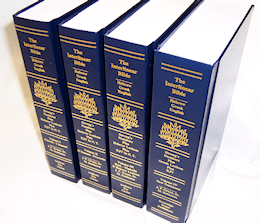Textus Receptus Bibles
Jay P. Green's Literal Translation 1993
| 11:1 | And the whole earth was of one lip and of one speech |
| 11:2 | And it happened, as they pulled up stakes from the east, they found a level valley in the land of Shinar. And they lived there. |
| 11:3 | And each one said to his neighbor, Come, let us make brick, and burning burn them. And they had brick for stone, and they had asphalt for mortar. |
| 11:4 | And they said, Come, let us build a city and a tower with its head in the heavens, and make a name for ourselves, that we not be scattered on the face of all the earth. |
| 11:5 | And Jehovah came down to see the city and the tower which the sons of Adam had built. |
| 11:6 | And Jehovah said, Behold, the people is one, and the lip one to all of them, and this they are beginning to do, and now all which they have purposed to do will not be restrained from them. |
| 11:7 | Come, let Us go down and confuse their language so that they cannot understand one another's speech. |
| 11:8 | And Jehovah scattered them from there, over the face of all the earth. And they stopped building the city. |
| 11:9 | On account of this its name is called Babel, because Jehovah confused the language of all the earth there. And Jehovah scattered them abroad from there on the face of all the earth. |
| 11:10 | These are the generations of Shem: Shem was a son of a hundred years and fathered Arpachshad two years after the flood. |
| 11:11 | And after he fathered Arpachshad, Shem lived five hundred years. And he fathered sons and daughters. |
| 11:12 | And Arpachshad lived thirty five years and fathered Salah. |
| 11:13 | And after he fathered Salah, Arpachshad lived four hundred and three years And he fathered sons and daughters. |
| 11:14 | And Salah lived thirty years and fathered Eber. |
| 11:15 | And after he fathered Eber, Salah lived four hundred and three years. And he fathered sons and daughters. |
| 11:16 | And Eber lived thirty four years and fathered Peleg. |
| 11:17 | And after he fathered Peleg, Eber lived four hundred and thirty years. And he fathered sons and daughters. |
| 11:18 | And Peleg lived thirty years and fathered Reu. |
| 11:19 | And after he fathered Reu, Peleg lived two hundred and nine years. And he fathered sons and daughters. |
| 11:20 | And Reu lived thirty two years and fathered Serug. |
| 11:21 | And after he fathered Serug, Reu lived two hundred and seven years. And he fathered sons and daughters. |
| 11:22 | And Serug lived thirty years and fathered Nahor. |
| 11:23 | And after he fathered Nahor, Serug lived two hundred years. And he fathered sons and daughters. |
| 11:24 | And Nahor lived twenty nine years and fathered Terah. |
| 11:25 | And after he fathered Terah, Nahor lived a hundred and nineteen years. And he fathered sons and daughters. |
| 11:26 | And Terah lived seventy years and fathered Abram, Nahor, and Haran. |
| 11:27 | And these are the generations of Terah: Terah fathered Abram, Nahor, and Haran. And Haran fathered Lot. |
| 11:28 | And Haran died before his father Terah in the land of his birth, in Ur of the Chaldeans. |
| 11:29 | And Abram and Nahor took wives for themselves. The name of Abram's wife was Sarai. And the name of Nahor's wife was Milcah, the daughter of Haran, the father of Milcah, and the father of Iscah. |
| 11:30 | And Sarai was barren; there was no child to her. |
| 11:31 | And Terah took his son Abram, and Lot, Haran's son, his grandson and his daughter-in-law Sarai, his son Abram's wife. And he went forth with them from Ur of the Chaldeans to go into the land of Canaan. And they came to Haran and lived there. |
| 11:32 | And the days of Terah were two hundred and five years; and Terah died in Haran. |

Green's Literal Translation 1993
Green's Literal Translation (Literal Translation of the Holy Bible - LITV), is a translation of the Bible by Jay P. Green, Sr., first published in 1985. The LITV takes a literal, formal equivalence approach to translation. The Masoretic Text is used as the Hebrew basis for the Old Testament, and the Textus Receptus is used as the Greek basis for the New Testament.
Green's Literal Translation (LITV). Copyright 1993
by Jay P. Green Sr.
All rights reserved. Jay P. Green Sr.,
Lafayette, IN. U.S.A. 47903.